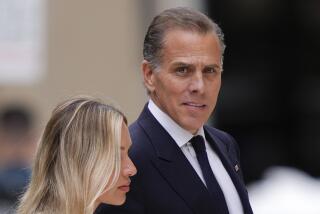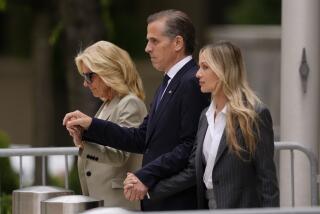First trial of Hussein is ending amid doubts
BAGHDAD — In a year filled with countless hours of emotional outbursts, tearful testimony and theatrical grandstanding, two fleeting moments in Saddam Hussein’s first trial on charges of crimes against humanity speak volumes.
The first came March 13, when lead Judge Raouf Rasheed Abdel Rahman scolded a codefendant for spending only two weeks to try and sentence to death 148 people from the Shiite Muslim village of Dujayl for their alleged involvement in a 1982 assassination attempt against the deposed president.
“How were you able to try 148 people in two weeks when in this trial it takes three hours to take the statement of one defendant?” Abdel Rahman demanded of former judge Awad Hamed Bandar, one of Hussein’s seven codefendants in the trial, which is scheduled to conclude today with verdicts that could send Hussein to the gallows.
“We were at war,” Bandar said. To supporters of the Iraqi High Tribunal, the moment threw into sharp relief the contrast between the callous disregard for defendants’ rights during the former regime and the time-consuming trial that Hussein and his deputies received.
The second came May 22, when the judge kicked Lebanese defense lawyer Bushra Khalil out of the courtroom.
“Get your hands off me!” she yelled to the bailiffs as she was ushered out -- a signature moment for the defendants and those who view the trial as a sham from its inception.
The presence of Khalil, a Shiite whose relatives had been victimized by Hussein, along with that of other lawyers from Jordan, Qatar and Egypt, served as a reminder that to many in Iraq and the region, the U.S.-backed court put Arab nationalism and pride on trial.
“This was the Iraqi judiciary system,” said lead defense attorney Khalil Dulaimi. “This trial has been a humiliation.”
Significant segments of the Iraqi population as well as international legal experts have cast doubt on the trial’s political neutrality.
Two of the defense lawyers have been assassinated during the trial, gunned down in Baghdad under mysterious circumstances. The defense has argued that Iraq’s security situation makes it an inappropriate venue for the trial. Iraqi and international legal experts have long argued that the trial should have been held in another country.
One U.S. official close to the tribunal acknowledged that the “violent situation has had an impact” on the trial. “No one envisioned the country being in the state it’s in when they started this thing,” the official said.
But, he added, “it wasn’t an issue that rendered the trial irredeemably unfair. No trial is perfect.”
Many Sunni Muslim Arabs in Iraq and the broader Middle East have cast suspicions on the date of the verdict, which judges moved from Oct. 16 to two days before hotly contested midterm congressional elections in the United States.
“Probably the Americans wanted to postpone the verdict,” said Mohammed Daini, a member of the National Dialogue Council, a Sunni political party in Iraq. “The American president, Bush, asked for this for a political gain in the elections that will be held in the U.S. this month.”
U.S. officials contest the allegation. They point out that they’ve been grumbling about the trial’s slow pace for months, and that they had hoped for a verdict in the spring to allow the special court to focus on the other ongoing trial against Hussein, in which he faces charges over a brutal 1980s military campaign against Kurds in the north.
“There’s no way we had that kind of control over these people,” said one U.S. official close to the trial, speaking on condition of anonymity. “This was toxic for us.”
From the start, the two sides battled in different courts -- the physical one and the court of public opinion.
The prosecutors remained in the orderly world of the heavily fortified multistory courthouse here. They focused on the 130 witnesses who gave written and spoken testimony and painstakingly compiled documentary evidence over 40 sessions, as if strict adherence to legal formulas could wash away questions about the legitimacy of a court set up under formal U.S. occupation.
The defense tried to broaden the scope of the trial, playing for the cameras and pan-Arab television with politically charged statements about the U.S. role in Iraq and recent Middle East history, as if questions about the court’s legitimacy could cleanse the mountain of evidence implicating Hussein in the horrific treatment of civilians.
After gunmen fired on the dictator’s motorcade during a July 8, 1982, presidential visit to Dujayl, Hussein and others allegedly conspired to exact revenge on the entire town, rounding up at least 600 men, women and children, submitting some to torture and others to summary executions, while banishing entire families to a barren desert prison for years.
At least 148 people were sentenced to death -- some of them after they had already died under torture, and several of them minors who were executed years later once they reached 18.
In addition, teams of bulldozers leveled the once-abundant orchards of Dujayl, turning a wealthy farming hub into an impoverished backwater.
Hussein himself, in one of the trial’s most dramatic moments, stood up and dismissed his own defense attorney’s attempt to portray the destruction of the orchards as a civic improvement project. He had ordered the destruction as retribution for the assassination attempt, he told the court.
The prosecution presented documentary evidence including official papers showing Hussein’s signature on a death warrant.
Prosecutors have complained that the defense has never really addressed the issue of guilt. “They’re not playing to the evidence,” said one U.S. official. “There was never an attempt to defend Saddam on the basis of the evidence.”
Times staff writer Saif Hameed contributed to this report.
More to Read
Sign up for Essential California
The most important California stories and recommendations in your inbox every morning.
You may occasionally receive promotional content from the Los Angeles Times.










